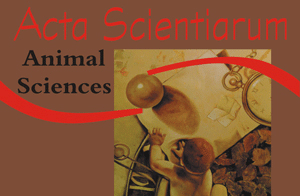ABSTRACT.
The objective was to evaluate the production of Megathyrsus maximus genotypes (Syn. Panicum maximum), under different levels of water in the soil. This was a 5x5 factorial completely randomized design conducted in a greenhouse, combining five genotypes of M. maximus (B55, C10 and PM30, cv. Massai and cv. BRS Tamani) and five levels of soil field capacities (20%, 40%, 60%, 100% and 140%), with three replications. Dry matter production was evaluated: leaf, stem, dead material, root, shoot and total dry matters, as well as the number of tillers and leaf:stem and aboveground:root ratios. The qualitative factor (genotypes) was subjected to Duncan test at 5% probability. The quantitative factor (% field capacity) was subjected to regression, adopting 5% as a critical level of probability. There was no interaction between the factors for any of the evaluated characteristics. Significant differences among the genotypes were detected for tiller number, dead material dry mass, root and total dry mass and leaf:stem ratio. There was no significant effect of the percentage of field capacity on most of the characteristics, except for leaf:stem and aboveground:root ratios. Cultivar Massai showed the best forage production compared to the other genotypes, regardless of the percentage of field capacity evaluated. In general, the evaluated genotypes were more tolerant to excess water stress than to water deficit.
Keywords:
Flooding; forage; water deficit; field capacity

 Thumbnail
Thumbnail
 Thumbnail
Thumbnail
 Thumbnail
Thumbnail
 Thumbnail
Thumbnail
 Thumbnail
Thumbnail
 Thumbnail
Thumbnail
 Thumbnail
Thumbnail






